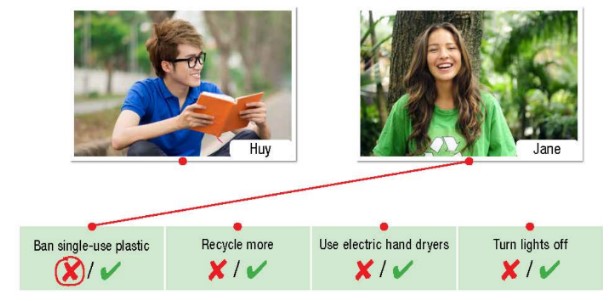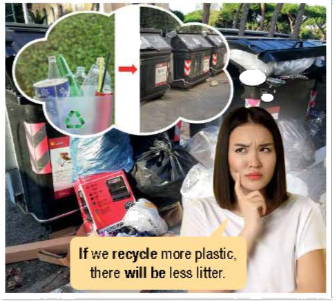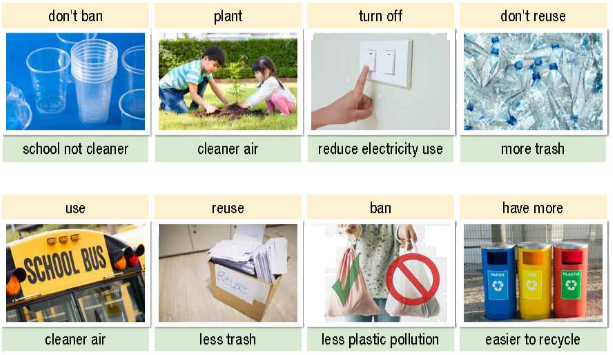Đừng bỏ lỡ những tính năng hấp dẫn của Baitap365.com
Unit 8: Ecology and the Environment
a. Match the words with the descriptions. Listen and repeat. b. In pairs: How do people in your community help to look after the environment? What else should they do? a. Listen to Huy and Jane talking about what they can do to protect the environment. Do they want to try their ideas at their school, in their town, or both? b. Now, listen and match Huy and Jane to their ideas. Circle the tick (✔) or cross (X) if the other person thinks it's a good or bad idea. c. Read the Conversation Skill box
New Words - a
a. Match the words with the descriptions. Listen and repeat.
(Nối các từ với các mô tả. Nghe và lặp lại.)
|
1. ban 2. reduce 3. reuse 4. recycle 5. pollute 6. protect 7. damage |
a. keep someone or something safe, or stop something dangerous happening. b. make the environment dirty c. make trash (paper, glass, plastic, etc.) into a new product d. make something less or smaller e. officially stop people from doing something f. hurt someone or something g. use something again |
New Words - b
b. In pairs: How do people in your community help to look after the environment? What else should they do?
(Theo cặp: Mọi người trong cộng đồng của bạn giúp chăm sóc môi trường như thế nào? Họ phải làm gì khác?)
People often recycle trash.
(Mọi người thường tái chế thùng rác.)
Our town should reuse plastic bags.
(Thị trấn của chúng ta nên tái sử dụng túi nhựa.)
Listening - a
a. Listen to Huy and Jane talking about what they can do to protect the environment. Do they want to try their ideas at their school, in their town, or both?
(Hãy lắng nghe Huy và Jane nói về những việc họ có thể làm để bảo vệ môi trường. Họ muốn thử ý tưởng của mình ở trường học, ở thị trấn của họ, hay cả hai?)
Listening - b
b. Now, listen and match Huy and Jane to their ideas. Circle the tick (✔) or cross (X) if the other person thinks it's a good or bad idea.
(Bây giờ, hãy lắng nghe và nối Huy và Jane với ý tưởng của họ. Khoanh tròn vào dấu (✔) hoặc gạch chéo (X) nếu người kia cho rằng đó là ý kiến hay hoặc không tốt.)

Listening - c
c. Read the Conversation Skill box and listen to Task b. audio again. Circle the phrases in the Conversation Skill box that you hear.
(Đọc hộp Kỹ năng hội thoại và nghe lại audio ở Bài b. Khoanh tròn các cụm từ trong hộp Kỹ năng Hội thoại mà em nghe được.)
Conversation Skill (Kỹ năng hội thoại)
Responding to ideas (Phản hồi ý kiến)
To respond to ideas, say your opinion
(Để phản hồi ý kiến, hãy nói ý kiến của bạn)
I think that will be difficult to do.
(Tôi nghĩ rằng điều đó sẽ khó thực hiện.)
That's a great idea.
(Đó là một ý tưởng tuyệt vời.)
Yes, I agree.
(Vâng, tôi đồng ý.)
Listening - d
d. Listen and repeat.
(Nghe và lặp lại.)
Listening - e
e. In pairs: Which idea do you think is the best? Why?
(Theo cặp: Em nghĩ ý tưởng nào là tốt nhất? Tại sao?)
Grammar - a
a. Listen and repeat.
(Nghe và lặp lại.)

If we recycle more plastic, there will be less litter.
(Nếu chúng ta tái chế nhiều nhựa hơn, sẽ có ít rác hơn.)
Grammar - b
b. Fill in the blanks.
(Điền vào chỗ trống.)
1. The air will be (be) less polluted if we use (use) school buses or public transportation.
2. If students __________ (not stop) littering, our school __________ (be) full of trash.
3. Students __________ (not litter) if we __________ (make) them clean the school.
4. Our school __________ (be) cleaner if we __________ (ban) single-use plastic.
5. If we __________ (reuse) water bottles, there __________ (be) less trash.
6. If there __________ (be) more recycling bins, it __________ (be) easier to recycle.
Grammar - c
c. Write two conditional sentences for each situation.
(Viết hai câu điều kiện cho mỗi tình huống.)
1. The school isn't clean. It's because of plastic trash from the cafeteria.
If-clause first: If we ban plastic from the cafeteria, the school will be cleaner.
If-clause last: The school will be cleaner if we ban plastic from the cafeteria.
2. We have lots of trash. We don't have a recycling program.
If-clause first:
If-clause last:
3. Many students don't turn off the lights when they go out. We use lots of electricity.
If-clause first:
If-clause last:
4. There's lots of paper trash. We don't reuse paper.
If-clause first:
If-clause last:
Grammar - d
d. In pairs: Make conditional sentences from the prompts in the table.
(Theo cặp: Đặt câu điều kiện từ các gợi ý trong bảng.)
|
Activity |
Result |
|
less/electricity |
save/money |
|
walk/school |
help/reduce/pollution |
|
ban motorcycles/city center |
less/traffic/city |
|
recycle/more/paper |
save/trees/forests |
If we use less electricity, we will save money.
(Nếu chúng ta sử dụng ít điện hơn, chúng ta sẽ tiết kiệm được tiền.)
Pronunciation - a
a. Intonation for conditional sentences falls at the end of the clauses.
(Ngữ điệu trong câu điều kiện nằm ở cuối mệnh đề.)
If we recycle more, the school will be cleaner.
(Nếu chúng ta tái chế nhiều hơn, trường học sẽ sạch hơn.)
There won't be as much trash if we ban single-use plastic.
(Sẽ không có nhiều rác nếu chúng ta cấm đồ nhựa dùng một lần.)
Pronunciation - b
b. Listen to the sentence and notice how the intonation falls.
(Nghe câu và để ý ngữ điệu rơi xuống như thế nào.)
If we use electric hand dryers, we will save tissues.
(Nếu chúng ta sử dụng máy sấy tay bằng điện, chúng ta sẽ tiết kiệm được khăn giấy.)
Pronunciation - c
c. Listen and cross out the sentence with the wrong intonation.
(Nghe và gạch bỏ câu có ngữ điệu sai.)
If we all use public transportation, the air will be cleaner.
(Nếu tất cả chúng ta đều sử dụng các phương tiện giao thông công cộng, không khí sẽ trong lành hơn.)
If we stop using plastic bags, we will reduce plastic pollution.
(Nếu chúng ta ngừng sử dụng túi ni lông, chúng ta sẽ giảm thiểu ô nhiễm nhựa.)
Pronunciation - d
d. Read the sentences with the correct intonation to a partner.
(Đọc các câu với ngữ điệu chính xác cho bạn cùng bàn của em.)
Practice - a
a. Ask and answer using the pictures and prompts.
(Hỏi và trả lời bằng cách sử dụng hình ảnh và gợi ý.)

- What will happen if we don't ban plastic cups?
(Điều gì sẽ xảy ra nếu chúng ta không cấm ly nhựa?)
- If we don't ban plastic cups, our school won't be cleaner.
(Nếu chúng ta không cấm ly nhựa thì trường chúng ta sẽ không sạch sẽ hơn.)
- What will happen if we plant trees?
(Điều gì sẽ xảy ra nếu chúng ta trồng cây?)
- If we plant trees,....
(Nếu chúng ta trồng cây,….)
Practice - b
b. Practice with your own ideas.
(Thực hành với ý tưởng của riêng bạn.)
Speaking - a
a. You are planning a presentation about protecting the environment in your school. In pairs: Add two more ideas for what you can do. Write why your ideas are good.
(Em đang lên kế hoạch cho một bài thuyết trình về bảo vệ môi trường trong trường học của em. Theo cặp: Thêm hai ý tưởng nữa cho những gì bạn có thể làm. Viết lý do tại sao ý tưởng của em là tốt.)
- Do you have any ideas for our presentation?
(Bạn có ý tưởng gì cho bài thuyết trình của chúng ta không?)
- We should put recycling bins around our school.
(Chúng ta nên đặt các thùng rác tái chế xung quanh trường học của chúng ta.)
- Why? (Tại sao?)
- If we put recycling bins around our school, we'll reduce trash.
(Nếu chúng ta đặt các thùng rác tái chế xung quanh trường học của chúng ta, chúng ta sẽ giảm bớt rác.)
- What we can do put recycling bins around school?
(Chúng ta có thể làm gì để đặt các thùng rác tái chế quanh trường?)

Speaking - b
b. Join another pair. Present your ideas to them. As a group, decide which idea is the best. Why do you think so?
(Tham gia một cặp khác. Trình bày ý tưởng của em với họ. Với tư cách là một nhóm, hãy quyết định ý tưởng nào là tốt nhất. Tại sao em nghĩ vậy?)
Our first idea is to put more recycling bins around the school. If we put recycling bins around our school, we'll reduce trash.The second idea is…
(Ý tưởng đầu tiên của chúng tôi là đặt nhiều thùng rác tái chế xung quanh trường. Nếu chúng ta đặt các thùng rác tái chế xung quanh trường học của mình, chúng ta sẽ giảm bớt rác thải. Ý tưởng thứ hai là …)
Mẹo tìm đáp án nhanh
Search Google: "từ khóa + baitap365" Ví dụ: "Bài 5 trang 13 SGK Vật lí 12 baitap365